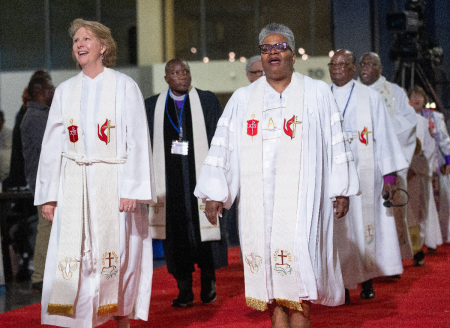UMC high court shuts down ‘gracious exit’ measure for departing churches

The United Methodist Church’s highest court has ruled that congregations seeking to leave the denomination over theological differences cannot do so via a church closure provision.
Recently, many congregations have left the UMC via a Book of Discipline measure known as Paragraph 2549, which is centered on how to officially close down a church property.
The United Methodist Judicial Council released a ruling last Saturday, known as Decision Number 1512, which stated that congregations cannot use Paragraph 2549 to exit the UMC.
According to the decision, the UMC’s Trust Clause, which holds that all church properties are held for the benefit of the whole denomination, cannot be disregarded as it would be by using Paragraph 2549 to disaffiliate.
“Connectionalism is a bedrock principle of United Methodist constitutional polity, and the Trust Clause is its foundational element,” stated the ruling.
“Disaffiliation is a radical departure from connectionalism, and, therefore, church property can be released from the Trust Clause only to the extent authorized by Church law.”
The Judicial Council went on to state that Paragraph 2549 “cannot be construed or used as legislation permitting the ‘gracious exit’ of local churches because it applies to church closure and the sale of property, not disaffiliation.”
“Paragraph 2549 does not give an annual conference disciplinary authority to close a local church and then provide all of the assets to the exiting congregants,” the ruling continued.
“Paragraph 2549 is not an appropriate provision of the Discipline for exiting with property. The provisions of ¶2549 do not align with what is being asked for, which is ‘disaffiliation’ and asking that the trust clause be broken.”
The Judicial Council ruling came in response to an official query by the UMC Kentucky Conference and the UMC Alabama-West Florida Conference.
The Kentucky Conference released a statement on Tuesday that, as a result of the Judicial Council decision, the regional body is “unable to offer a path to separation from the United Methodist Church for local churches.”
“Of course, as has always been the case, individuals are free to pursue the faith expression of their choosing,” the conference stated.
“We continue to believe that The United Methodist Church is a place for all people, and we remain committed to our mission of making disciples of Jesus Christ for the transformation of the world.”
For decades, the UMC debated whether to change its rules to allow the blessing of same-sex unions, the ordination of noncelibate homosexuals, and the funding of LGBT advocacy groups, eventually doing so at General Conference earlier this year.
At a special session of the General Conference held in February 2019, delegates voted to add Paragraph 2553 to the Book of Discipline. The measure, which expired at the end of 2023, created a process for congregations to leave the UMC over the sexual ethics debate.
Approximately 7,500 congregations disaffiliated from the denomination during that time, with thousands joining the recently launched theologically conservative Global Methodist Church.
Even after Paragraph 2553 expired, however, many churches had continued to leave the denomination via Paragraph 2549 of the Book of Discipline, which is in regards to closing down churches.
According to the measure, a district superintendent can recommend that a local church be closed if it “no longer serves the purpose for which it was organized or incorporated.”
From there, conference leadership can declare the property closed and then can “retain, sell, lease, or otherwise dispose of the property of a closed local church in accordance with the direction of the annual conference, if any.”





















